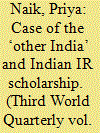| Srl | Item |
| 1 |
ID:
134409


|
|
|
|
|
| Summary/Abstract |
IR scholarship in India has focused on the borders, territory and sovereignty of the Indian state, overlooking the rich complexity of interior border formation between colonial and independent India. The paper argues that the study of the princely states under the British paramountcy (1858–1947), neglected so far, is valuable to ir scholarship on three grounds. First, in mapping colonial India’s engagement with the outside world, the focus has been solely on British India. The princes were equally participative and perceptive of the outside world. Second, the princely states represent yet another challenge to the Westphalian notion of sovereignty, demonstrating the limited capacity of European categories to understand the ‘non-West’. Third, incorporating the paramountcy system in the genealogy of sovereignty of the Indian subcontinent offers a fresh account of border construction inside the state.
|
|
|
|
|
|
|
|
|
|
|
|
|
|
|
|
| 2 |
ID:
151222


|
|
|
|
|
| Summary/Abstract |
Making an inventory of postcolonial scholarship on India reveals both its criticality and its limits. While the body of postcolonial work has been remarkable for pointing out the oppression under the British, it has been stubbornly silent about the Indian princes. This article does four things: First, it points out the uneven development of scholarship on the Indian princes and attempts to demonstrate why the Indian princes, their history and politics remain unappealing to postcolonial theorists. Second, it posits that the continued neglect of the Indian princes is part of a larger malaise of modern India. The remaining part of the article prises upon the Indian princes to look at how their subjectivity and gaze have been overlooked to produce a certain kind of narrative about them, which is coarse and unable to accommodate their complexity. It finally reverses the gaze by looking at the kingdoms from inside out. By looking into the works written by insiders, it offers a previously unheard voice.
|
|
|
|
|
|
|
|
|
|
|
|
|
|
|
|